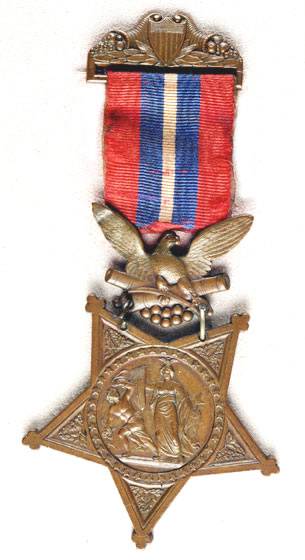 Open main menu
Open main menu
 Open main menu
Open main menu

Organization: Company B, 9th New York Infantry
Entered Service: New York, N.Y.
Birth: 29 September 1846, Germany.
Date Medal Issued: 7 January 1895.
Date of Action: 19 April 1862.
Place of Action: Camden, N.C.
Citation
A drummer boy, 15 years of age, he voluntarily and under a heavy fire went to the aid of a wounded officer, procured medical assistance for him, and aided in carrying him to a place of safety.
More about this award
From the pages of the Medal of Honor file for J.C. Julius Langbein ...
Correspondence concerning Langbein's application for the medal includes a clipping from the Grand Army Journal dated June 23, 1893. That newspaper article recounts the story of a thirteen-year-old drummer boy who enlisted with the Ninth New York Infantry Volunteers, Hawkins' Zouaves, on May 4, 1861. Because of his girlish looks and slight stature, Langbein was called "Jennie" by the soldiers of the Ninth New York, a name he failed to shake until leaving the unit two years later. Despite the ridicule over his feminine features, Jennie so proved his mettle to the unit that the officers invited him to bunk and mess in their quarters. Second Lt. Thomas L. Bartholomew became particularly fond of Jennie and promised the boy's mother that he would personally look after him.
Tromping through the lowlands of eastern North Carolina on April 19, 1862, the Ninth New York met with units under the command of Gen. Jesse Lee Reno at South Mills, roughly twenty miles south of Norfolk, Virginia. With the amassing Union forces in their sights, a Confederate artillery unit, under the command of Capt. William W. McComas, opened fire. In the ensuing battle, a shell fragment struck Lieutenant Bartholomew just above his right ear, rendering him unconscious.
"My first impression on being struck was, that I had been clubbed with the butt of a musket. I lost consciousness almost immediately," recalled Bartholomew. "When Jennie saw me fall . . . he rushed upon the field and amid the shot and shell and the din and smoke of the battle, caught me and tenderly led me back to a ditch. . . . He left but soon returned with Dr. Humphreys."
Hustling from wounded to wounded, the doctor quickly examined the lieutenant's injuries, concluded Bartholomew would soon die, and left him to tend to other wounded. Undaunted, Jennie left once again and returned with the unit's drum major. Together they carried Bartholomew to the safety of a nearby house. Hours later, as the regiment prepared to pull out of the area, a doctor again determined Bartholomew too enfeebled to be moved and "left [him] to the tender mercies of the enemy."
Again, Jennie defied authority. "He quietly came to my bedside and whispered 'Keep quiet, Lieutenant, you shall not be left behind. I have arranged it all.'" After seemingly leaving Bartholomew alone with the other men left to face the approaching enemy, "Jennie and . . . two comrades . . . quietly but quickly . . . placed [me] in the rear of the end of the wagon, where there was hardly room to put a child, but I was actually squeezed in just as the wagon started."
Bartholomew was taken to a hospital where he recovered from his near-fatal wounds. The other officers of the unit recognized Jennie's heroism. First Lt. G.A.C. Barnett of the Ninth New York Volunteer Infantry granted Jennie a thirty-day furlough to return home and gave him a message to pass on to his mother.
I must say that as a boy he is good and as a soldier he is excellent. Beyond all things I must speak well of his bravery and attention to his duties on the field. . . . You should be proud of such a son for we all are.
Langbein continued his success after the war. After attending law school and opening his own practice, he served as an assemblyman in the New York State legislature and as judge of the Seventh Judicial District Court. But it was not until thirty years after his daring feat that Langbein wrote to the Record and Pension Office of the AGO to inquire about receiving a Medal of Honor. After completing some paperwork, the AGO delivered Langbein's medal through the U.S. mail on January 7, 1895.
Above quoted from "The Army Medal of Honor: The First Fifty-five Years" by Mark C. Mollan in Prologue, the Journal of the Archives (NARA), Summer 2001, Vol. 33, No. 2
See also ... a piece about a statue of him in Woodlawn Cemetery, NY., and a picture of him from the 9th NY site
More on the Web
http://www.archives.gov/publications/prologue/summer_2001_medal_of_honor_1.html